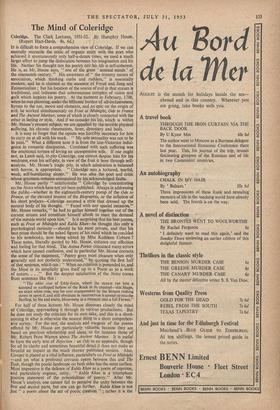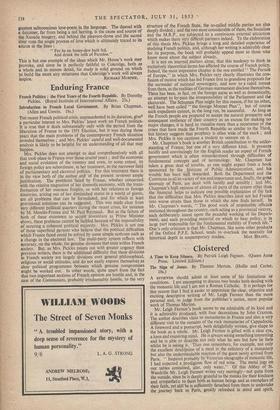The Mind of Coleridge
Coleridge. The Clark Lectures, 1951-52. By Humphry House. (Rupert Hart-Davis. 8s. 6d.) IT is difficult to form a comprehensive view of Coleridge. If we can mentally reconcile the critic of organic unity with the poet who achieved it spontaneously only half-a-dozen times, we need a much larger effort to jump the dislocation between his imagination and his life. Neither his thought nor his poetry nor his life is self-coherent. He is, as Mr. House says, "one of the great ' seminal minds ' of the nineteenth century." His awareness of" the streamy nature of association, which thinking curbs and rudders," is essentially modern, and he is claimed as the ancestor of Freud and Jung and Existentialism ; but his location of the source of evil in that stream is traditional, and indicates that subconscious complex of vision and guilt which inspires his poetry. At the moment in February, 1798, when he was planning, under the Miltonic burden of all-inclusiveness, hymns to the sun, moon and elements, and an epic on the origin of evil, he worked simultaneously on Frost at Midnight, Ode to France and The Ancient Mariner, none of which is closely connected with the other in feeling or style. And if we consider his life, which is within Mr. House's present subject, we are appalled by the terrible physical suffering, his chronic rheumatism, fever, dysentery and boils.
It is easy to forget that the opium was horribly necessary for him to carry on at all with his work. "My sole sensuality was not to be In pain." What a different note it is from the late-Victorian indul- gence in romantic dissipation. Combined with such suffering was the emotional torture of loving an unresponsive wife. If one ought not, as Lamb said, to pity Coleridge, one cannot despise him for his weakness, even his self-pity, in view of the fruit it bore through self- analysis. Mr. House's tragic pity, in which admiration is balanced with horror, is appropriate. "Coleridge was a tortured, tearful, weak, self-humiliating sinner." He was also the poet and critic whose greatness remains unimpaired by his acknowledged faults.
Mr. House partly " unlabyrinths " Coleridge by concentrating on the Notes which have not yet been published. Always in addressing the public—whether in the eighteenth-century pomp of the Ode to France, or the elevated tension of the Biographia, or the inflation of his short prefaces—Coleridge assumed a style that dressed up the natural body of his thought. " Faced with any special occasion," Mr. House remarks, "he had to gather himself together out of the current stream and constitute himself afresh to meet the demand of the outside world upon him." Is it surprising that his best poems, such as Frost at Midnight and Kubla Khan—he thought this only a psychological curiosity —should be his most private, and that his best prose should be the naked figures of his mind which he comided to his notebooks, now being edited by Miss Kathleen Coburn ? These notes, liberally quoted by Mr. House, enhance our affection and feeling for that mind. The Anima Poetae contained many errors which have caused confusion, and in particular Mr. House corrects the sense of the statement, "Poetry gives most pleasure when only generally and not perfectly understood," by quoting the first half of that sentence, which ran : " When no criticism is pretended to, and the Mind in its simplicity gives itself up to a Poem as to a work of nature. . . ." But the deepest satisfaction of the Notes comes from sentences like this : "The white rose of Eddy-foam, where the stream ran into a scooped or scolloped hollow of the Rock in its channel—this Shape, an exact white rose, was for ever overpowered by the Stream rushing down in upon it, and still obstinate in resurrection it spread up into the Scollop, by fits and starts, blossoming in a moment into a full Flower."
For half of these lectures Mr. House discusses closely the mind of Coleridge, approaching it through its various productions. But he does not study the criticism for its own sake, and this is a short- coming in what is otherwise the nearest thing to a short comprehen- sive survey. For the rest, the analysis and exegesis of the poems offered by Mr. House are particularly valuable because they are based on previous scholarship and ideas, as for instance those of Mr. Robert Penn Warren about The Ancient Mariner. It is useful to have the early text of Dejection :an Ode in an appendix, though for all its clarity and sometimes beautiful detail it does not make as forceful an impact as the much shorter published version. Also, Cowper is placed as a vital influence, particularly on Frost at Midnight —and yet what a profound crevasse opens between this and The Task, though the poetic landscape on both sides has the same surface. Most impressive is the defence of Kubla Khan as a poem of supreme, and particularly organic, unity. " Kubla Khan is a triumphant positive statement of the potentialities of poetry." After Mr. House's analysis one cannot fail to perceive the unity between the first and second parts, but one can go further. Kubla Khan is not just " a poem about the act of poetic creation " ; rather it is the greatest subconscious love-poem in the language. The damsel with a dulcimer, far from being a red herring, is the cause and source of the Xanadu imagery, and behind the pleasure-dome and the sacred river runs the single process of love which is ultimately traced to its source in the lines :
"For he on honey-dew hath fed, And drunk the milk of Paradise."
This is but one example of the ideas which Mr. House's work may provoke, and since he is perfectly faithful to Coleridge, both as a whole and in minute detail, his study is solid ground on which to build the more airy structures that Coleridge's work will always



































 Previous page
Previous page